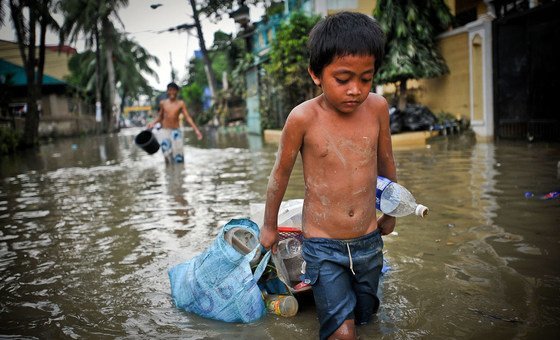
Typhoons Kristine and Leon caused widespread damage in the Philippines, leaving thousands of families and children without access to safe water and sanitation facilities.
The 11th and 12th tropical cyclones to hit the country this year affected at least 4.2 million individuals – approximately 1.3 million of them children – and displaced over 300,000.
Worsening water and sanitation crisis
The recent typhoons have exacerbated pre-existing fragilities where access to safe water and sanitation services was already limited. In some communities, open defecation has been reported with facilities washed away, raising concerns about disease outbreaks.
“We can’t emphasise enough the importance of lifesaving supplies during and after an emergency,” said UNICEF Representative to the Philippines Oyunsaikhan Dendevnorov.
“We are working with our partners to provide water, sanitation and hygiene supplies to affected families and children to ensure their access to critical measures against the spread of diseases,” she stressed.
Since October 31, the UN Children’s Fund (UNICEF) and partners have distributed 2,950 hygiene and water kits to families in the hardest-hit provinces of Camarines Sur and Albay in the Bicol Region.
An additional 350 kits will be delivered in the coming days through partnerships with Action Against Hunger and Plan International Pilipinas.
Education disrupted
The Department of Education estimates that at least 500 schools in the Bicol Region need urgent assistance, with the recent typhoons disrupting learning for 20 million children nationwide.
“UNICEF strongly urges that schools remain dedicated to education and not used as evacuation centres so that children continue to have a stable learning environment,” said UNICEF Philippines Education Chief, Akihiro Fushimi.
In collaboration with local education authorities, UNICEF is set to provide educational supplies to 14,594 learners and 765 teachers in 25 schools and five Community Development Centres.
“Ensuring that children’s learning is not disrupted is a priority for UNICEF,” Mr. Fushimi further emphasised, highlighting the importance of providing children with a sense of normalcy amid the chaos.
A season of uncertainty
The Philippines, already Southeast Asia’s most disaster-prone country, faces increasingly frequent and severe weather events due to climate change.
With storms Marce and Nika impacting many of the same regions last weekend and a new weather system forming that could become Tropical Storm Ofel, recovery efforts are under immense strain.
Despite these challenges, the government has ramped up its response, while UNICEF and its partners continue to support communities with critical resources and interventions.
UN Resident Coordinator in the Philippines Gustavo González recently explained in a blog on the growing risk posed by natural hazards for UN News: “As we see, the exposure to disasters and the vulnerability to climate change have compelled Filipinos to cultivate a unique sense of resilience. The ‘saving lives’ spirit is widely spread within local communities.”
“As Filipinos frequently say, ‘as long as there is life, there is hope,’” he added.
